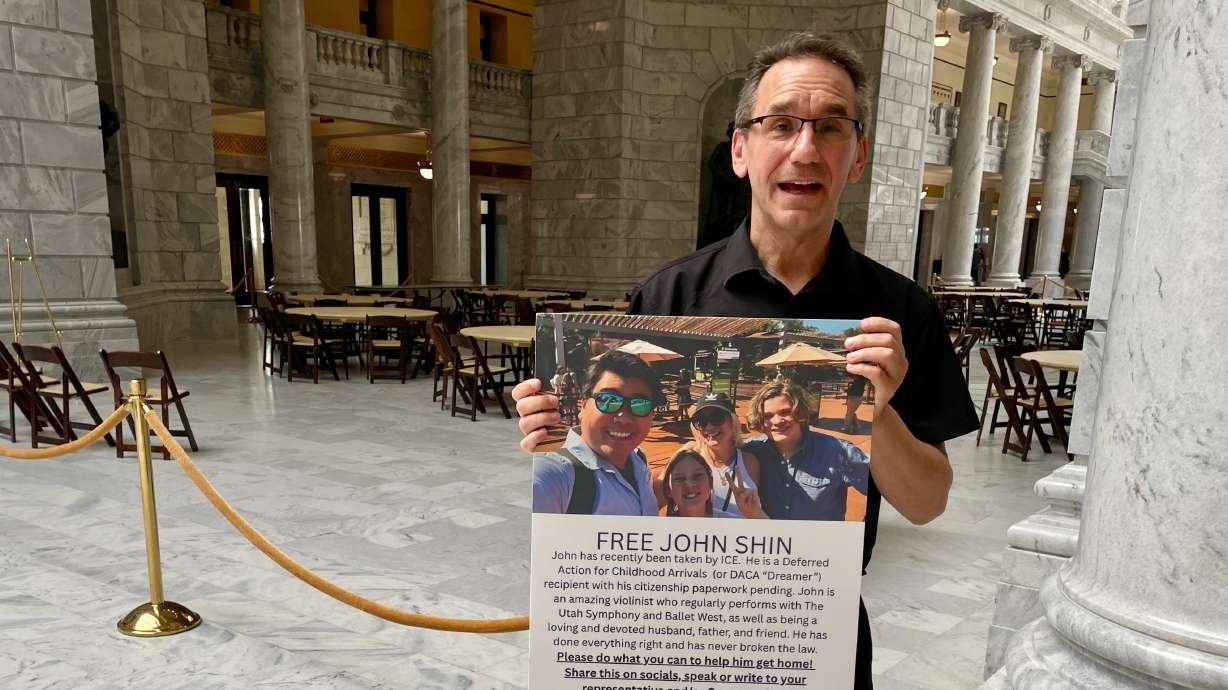Top Stories
Trump opens the door for private equity and crypto as 401k options

NEW YORK (AP) — Millions of Americans saving for retirement through 401(k) accounts could have the option of putting their money in higher-risk private equity and cryptocurrency investments, according to an executive order signed Thursday by President Donald Trump that could give those financial players long-sought access to a pool of funds worth trillions.
There is no immediate change in how people invest part of their work earnings. Federal agencies would need to rewrite rules and regulations to allow the expanded choices, and that would take months or more to complete. But once done, employers could offer a broader array of mutual funds and investments to workers, according to the White House. New plans could invest in alternative assets, particularly private equity, cryptocurrencies and real estate.
The Republican president’s order directs the Labor Department and other agencies to redefine what would be considered a qualified asset under 401(k) retirement rules.
Americans’ retirement plans are governed by a law known as the Employee Retirement Income Security Act of 1974, better known as ERISA. Employers are required by law to offer retirement options that are in the best interest of their employees, not Wall Street. Most retirement plans for Americans are made up of stock and bond investments, and to a much lesser extent, cash and heavily traded commodities such as gold.
Trump’s move rewards both the $5 trillion private equity industry, which for decades has wanted to compete for a role in retirement plans, and the cryptocurrency industry, whose executives strongly supported Trump’s 2024 campaign as they aimed for more mainstream acceptance among Americans.
The price of bitcoin was up 2% on Thursday to $116,542 and has nearly doubled since Trump was elected.
Under Democratic President Joe Biden, federal regulators were to treat cryptocurrency investments with “extreme care” because of the extreme volatility of crypto. It is not uncommon for bitcoin, ethereum and other big cryptocurrencies to move up or down 10% in a single day, whereas a 2% or 3% single-day move in the stock market would be considered historic.
For cryptocurrency companies, which donated millions to Trump’s campaign as well as his inauguration, one goal was to get their industry qualified under ERISA. Coinbase, one of the largest crypto companies in the United States, was also a major donor toward Trump’s military parade in Washington this summer. Under Trump, the Securities and Exchange Commission dropped its lawsuit against Coinbase, where the Biden administration said crypto should be treated as a security.
Crypto is particularly popular among young Americans. While volatile, bitcoin has generally moved upward since it was created by an anonymous programmer nearly 20 years ago.
“It was inevitable that bitcoin would make its way into American 401(k)’s,” said Cory Klippsten, the CEO of Swan Bitcoin. “As fiduciaries realize bitcoin’s risk-adjusted upside over the long term, we’ll see growing allocations, especially from younger, tech-savvy workers who want hard money, not melting ice cubes.”
Private equity firms rely heavily on high-net-worth individuals and state and private pension plans, which have extremely long investment timelines. But having access to Americans’ retirement assets would open up a deep pool of cash.
Blackstone CEO Steve Schwarzman has told investors going back to at least 2017 that it was a “dream” of his and the industry to be able to draw upon these retirement assets. Previous administrations, Republican and Democrat, have agreed that private equity investments, which can be riskier, more expensive and less liquid than traditional stock and bond market mutual funds, should not be included in 401(k) plans.
The average historic annual return on private equity assets going back to 1990 is roughly 13%, net of fees, according to Cambridge Associates. The S&P 500 index has had an approximate annual return, including dividends, of roughly 10.6% in the same period of time. However, private equity assets tend to be locked up for years, because the companies underlying the assets have to be sold on the private market, making them highly illiquid compared to stocks, which can be sold in a day.
“We look forward to working with the Trump Administration on a thoughtful framework that expands access to alternatives for retirement savers, offering Americans more diversification and investment options with appropriate investor guardrails,” said Bryan Corbett, the president and CEO of the Managed Funds Association, which is the trade group for the private equity industry.
Even after the regulations are written, it will take time for major retirement plan companies, such as Fidelity, Vanguard, T. Rowe Price, and others, to develop appropriate funds for employers to use. Employers are unlikely to revise their retirement plan options quickly, so it may take several years before crypto and private equity investments become mainstream in an individual’s retirement plan.
“While Vanguard has not committed to launching a product for defined contribution plans, Vanguard is dedicated to educating retirement investors to ensure a clear understanding of the opportunities and risks of investing in private assets,” the company said in a statement.
___
Top Stories
Aid flotilla with Greta Thunberg set to sail for Gaza to ‘break illegal siege’ | Greta Thunberg

A flotilla carrying humanitarian aid and activists, including Swedish climate campaigner Greta Thunberg, is due to leave from Barcelona on Sunday to try to “break the illegal siege of Gaza”, organisers said.
The vessels will set off from the Spanish port city to “open a humanitarian corridor and end the ongoing genocide of the Palestinian people”, said the Global Sumud Flotilla.
They did not say how many ships would set sail or the exact time of departure.
The flotilla is expected to arrive at the war-ravaged coastal enclave in mid-September.
“This will be the largest solidarity mission in history, with more people and more boats than all previous attempts combined,” Brazilian activist Thiago Ávila told journalists in Barcelona last week.
Organisers say that dozens of other vessels are expected to leave Tunisian and other Mediterranean ports on 4 September.
Activists will also stage simultaneous demonstrations and other protests in 44 countries “in solidarity with the Palestinian people”, Thunberg, who is part of the flotilla’s steering committee, wrote on Instagram.
As well as Thunberg, the flotilla will include activists from several countries, European lawmakers and public figures such as former Barcelona mayor Ada Colau.
“We understand that this is a legal mission under international law,” leftwing Portuguese lawmaker Mariana Mortágua, who will join the mission, told journalists in Lisbon last week.
Israel has already blocked two attempts by activists to deliver aid by ship to Gaza, in June and July.
In June, 12 activists on board the sailboat Madleen were intercepted by Israeli forces 185km west of Gaza. Its passengers, who included Thunberg, were detained and eventually expelled.
In July, 21 activists from 10 countries were intercepted as they tried to approach Gaza in another vessel, the Handala.
Top Stories
Here are the winning numbers for the $1B Powerball jackpot

The winning numbers for the $1 billion Powerball jackpot were drawn Saturday night.
The numbers are: 3, 18, 22, 27 and 33 and the red Powerball 17.
After nearly three months without a grand-prize winner, the dream of becoming America’s next billionaire sent ticket sales soaring across the nation ahead of the Labor Day weekend drawing.
Game officials increased the jackpot estimate Friday morning from $950 million after reviewing national ticket sales, Powerball said. The winner could opt for a cash payment of $453.1 million before taxes.
The game hasn’t seen a jackpot winner since May 31, when a California player claimed a $204.5 million prize. During this 39-drawing streak, the game has created 62 million-dollar winners and 608 tickets worth $50,000 or more.
The previous drawing on Wednesday saw six tickets match all five white balls — 9, 12, 22, 41 and 61 — with red Powerball 25, each winning $1 million or more.
Winners of Saturday’s jackpot can choose between annual payments or the lump sum. The annuity option provides one immediate payment followed by 29 annual payments that increase by 5% each year.
Powerball tickets cost $2 per play and are sold in 45 states, the District of Columbia, Puerto Rico and the U.S. Virgin Islands. The odds of winning the jackpot are 1 in 292.2 million, while the overall odds of winning any prize are 1 in 24.9.
The game has generated more than $36 billion for good causes supported by U.S. lotteries since its first drawing in 1992, Powerball noted. More than half of ticket sale proceeds remain in the jurisdiction where the ticket was sold, according to Powerball.
The current jackpot ranks sixth among Powerball’s largest prizes. The record stands at $2.04 billion, won by a California player in November 2022, followed by the $1.765 billion prize claimed in California in October 2023.
Other notable jackpots include the $1.586 billion split among winners in California, Florida and Tennessee in January 2016, the $1.326 billion won in Oregon in April 2024, and the $1.08 billion claimed in California in July 2023.
Copyright © 2025 ABC News Internet Ventures.
Top Stories
‘Way too much’: Utah violinist’s detention by immigration officials sparks backlash from backers

SALT LAKE CITY — That federal immigration officials are taking aim at John Shin, a violinist originally from South Korea, is a misuse of resources, Gabriel Gordon charges.
“That is just way too much for somebody who gives so much to this community and to this society. He’s a great father and a great husband and a great friend and a great musician, and this just shouldn’t be happening to him,” said Gordon, a fellow violinist.
Shin, who has a master’s degree in music performance from the University of Utah and has performed with the Utah Symphony and Ballet West, has long lived in Utah. He now finds himself in a federal immigration detention center in Aurora, Colorado.
Shin’s Salt Lake City lawyer, Adam Crayk, offered stronger words. A hearing in his client’s case is set for next Tuesday.
“Unless there is something out there, some sort of smoking gun that the government is hiding that’s going to be revealed in his first court (appearance), this is one of the most dumb, idiotic, egregious wastes of federal resources that I’ve had to deal with in a while,” Crayk said.
Shin legally entered the country, he noted, and has been married to an American woman for four years.
Shin, brought from South Korea as a child by his father, was unexpectedly detained on Aug. 18 by immigration officials, part of President Donald Trump’s crackdown on illegal immigration across the country. The arrest has prompted a strong public outcry from his family and supporters. Gordon and oboist Nicole Fullmer — longtime friends — have been regularly playing music in the rotunda of the Utah Capitol in Salt Lake City to call attention to what they view as a miscarriage of justice.
“He is a wonderful person. He is good for the community. He is a positive influence on everyone he touches. He absolutely does not deserve to be deported,” said Fullmer. She studied music at the U. with Shin and Shin’s American wife Danae Snow, who plays the viola.
Regardless, as immigration officials ratchet up efforts around the country to detain and deport immigrants in the country illegally, federal officials offered their own tough response.
Gordon understands Shin entered the United States on an immigrant visa and later secured status under the Deferred Action for Childhood Arrivals program, which allows eligible immigrants brought to the country illegally by their parents to remain and work in the United States. However, a senior U.S. Department of Homeland Security official stated that Shin entered the country from South Korea in 1998 on a tourist visa. That visa, according to the official, required him to leave the following year.
“Over 25 years later, he was still illegally in the U.S.,” reads the statement to KSL.com from the official. Trump and Department of Homeland Security Secretary Kristi Noem “are committed to restoring integrity to the visa program and ensuring it is not abused to allow aliens a permanent one-way ticket to remain in the U.S. Our message is clear: Criminal illegal aliens are not welcome in the United States.”
While the Trump administration’s approach has garnered support from many, Shin’s backers are equally resolute, and the case underscores the complex sentiments the immigration issue has stirred. Shin and his family have received nearly $70,000 in donations from supporters as part of a GoFundMe campaign to raise funds for his legal defense and his backers are planning a benefit concert on Monday, Sept. 1, for Shin.
The case also highlights the debate about the weight of prior brushes with the law, particularly if they’re relatively minor, in determining whether immigrants face the force of the immigration crackdown.
The Department of Homeland Security said Shin’s “criminal history includes a DUI conviction,” that is, a conviction for driving under the influence, presumably of alcohol. Crayk, though, said the 2019 charge, originally driving under the influence, was ultimately reduced to the less-severe driving while impaired, a class B misdemeanor.
He said the impaired driving charge “requires no sort of forgiveness, no sort of waiver” to fix Shin’s migratory status.
“We just have to prove he entered the United States lawfully and that he is legitimately married to a United States citizen,” Crayk said. He didn’t immediately respond to a query about the significance of immigration officials’ contention that Shin overstayed a tourist visa, supplied after Crayk initially spoke with KSL.com.
Crayk blasted the apparent resources that immigration officials poured into Shin’s detention. He was detained, the lawyer said, by a special Department of Homeland Security team that typically focuses on immigrant fugitives involved in drug trafficking and other serious crimes. Indeed, at next Tuesday’s hearing, Shin will seek release from detention on bond, and meeting the requirements — showing that he’s not a danger to the community or a flight risk — “should be fairly easy,” Crayk said.
Meantime, Shin now regularly speaks by phone with his wife, though she was initially unable to reach him after his arrest. “He’s maintaining a relatively positive attitude,” Crayk said.
Members of the music community, for their part, are getting word out about Shin’s case and trying to drum up support for him. They’ve launched a letter-writing campaign aimed at the immigration judge in Shin’s case to demonstrate the community’s backing for him. Next Monday’s benefit concert, featuring Shin’s musician friends and Kurt Bestor, a Grammy-nominated musician, is set for 7 p.m. and will be held at First United Methodist Church at 203 S. 200 East in Salt Lake City.
“John is probably one of the kindest people I know. He’s just always very positive and upbeat,” Fuller said. “There has been a huge outpouring of people, both who know him and/or know Danae and people who even don’t necessarily know them personally but have worked with them.”
Gordon thinks there are more problematic issues than Shin.
“There are actual problems here in this country that need to be solved. John and people like him are not one of them, that’s for sure,” he said. “They add to our country, and they add to our society and they should stay.”
The Key Takeaways for this article were generated with the assistance of large language models and reviewed by our editorial team. The article, itself, is solely human-written.
-
Tools & Platforms3 weeks ago
Building Trust in Military AI Starts with Opening the Black Box – War on the Rocks
-

 Ethics & Policy1 month ago
Ethics & Policy1 month agoSDAIA Supports Saudi Arabia’s Leadership in Shaping Global AI Ethics, Policy, and Research – وكالة الأنباء السعودية
-

 Events & Conferences3 months ago
Events & Conferences3 months agoJourney to 1000 models: Scaling Instagram’s recommendation system
-

 Business2 days ago
Business2 days agoThe Guardian view on Trump and the Fed: independence is no substitute for accountability | Editorial
-

 Jobs & Careers2 months ago
Jobs & Careers2 months agoMumbai-based Perplexity Alternative Has 60k+ Users Without Funding
-

 Funding & Business2 months ago
Funding & Business2 months agoKayak and Expedia race to build AI travel agents that turn social posts into itineraries
-

 Education2 months ago
Education2 months agoVEX Robotics launches AI-powered classroom robotics system
-

 Podcasts & Talks2 months ago
Podcasts & Talks2 months agoHappy 4th of July! 🎆 Made with Veo 3 in Gemini
-

 Podcasts & Talks2 months ago
Podcasts & Talks2 months agoOpenAI 🤝 @teamganassi
-

 Mergers & Acquisitions2 months ago
Mergers & Acquisitions2 months agoDonald Trump suggests US government review subsidies to Elon Musk’s companies





















